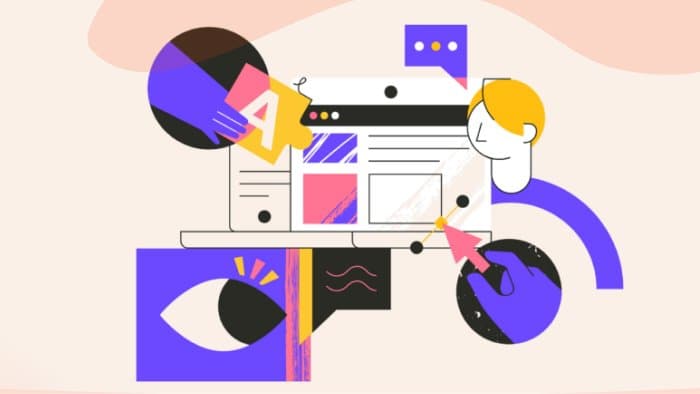The Ultimate Guide to Donor Management Software Development
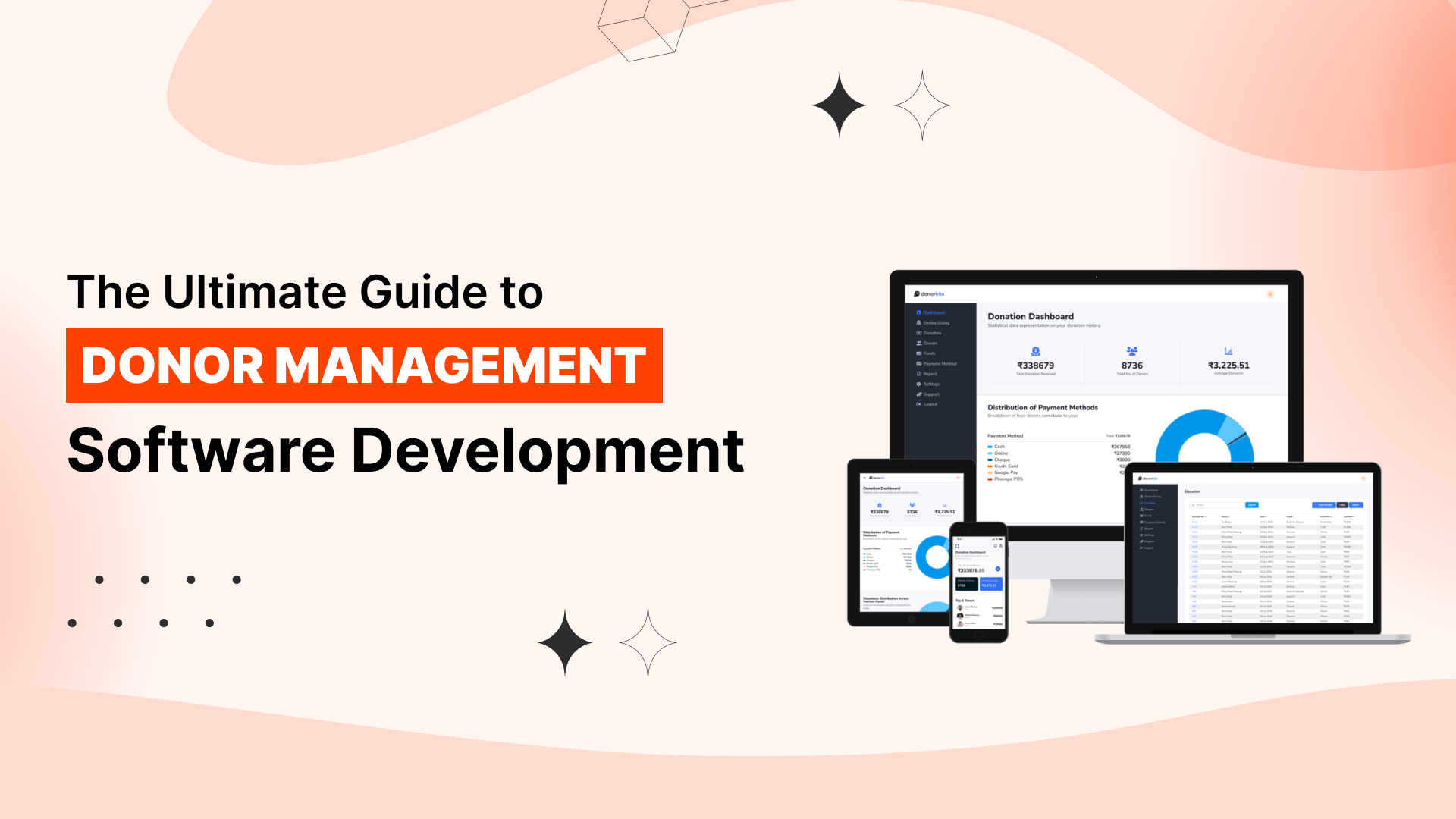
Building and maintaining a strong relationship with donors is crucial for non-profit organizations that rely on donations. However, attracting new donors, managing a network of existing ones, tracking their contributions, and maintaining connections can be overwhelming, especially for those who still depend on manual data processing and spreadsheets to manage donor data. But now, with the emergence of Donor Management Software, it has become easy to streamline and optimize such tasks. While there are tons of donor management software tools in the market, we still recommend you develop one tailored to your specific needs.
If you opt for custom donor management software development, you can expect a powerful system that helps your non-profit organization streamline operations, solidify relationships, and elevate your fundraising efforts. To help you understand what it takes to develop a donor management system, we have created this detailed guide covering its basic concepts, core features, and benefits. Finally, we will add a step-by-step guide to the non-profit donor management software development process as suggested by our software development service experts.
So, this guide will going to be your ultimate destination to find all the information about custom donor management software development. Let’s get started, but first…
Key Statistics on Donation Management Software
- The global donor management software market was valued at $1.3 billion in 2023 and is forecasted to reach $3.3 billion by 2030, growing at a CAGR of 13.4%. (Source: VerifiedMarketReports)
- The average retention rates for donations range between 40% to 50%. (Source: BigSea)
- Organizations report a 30-50% reduction in time spent on administrative tasks like data entry and reporting with donor management software. (Source: Kohezion)
- Over 75% of donations from Gen Z and Millennials come through mobile devices. (Source: Kindful)
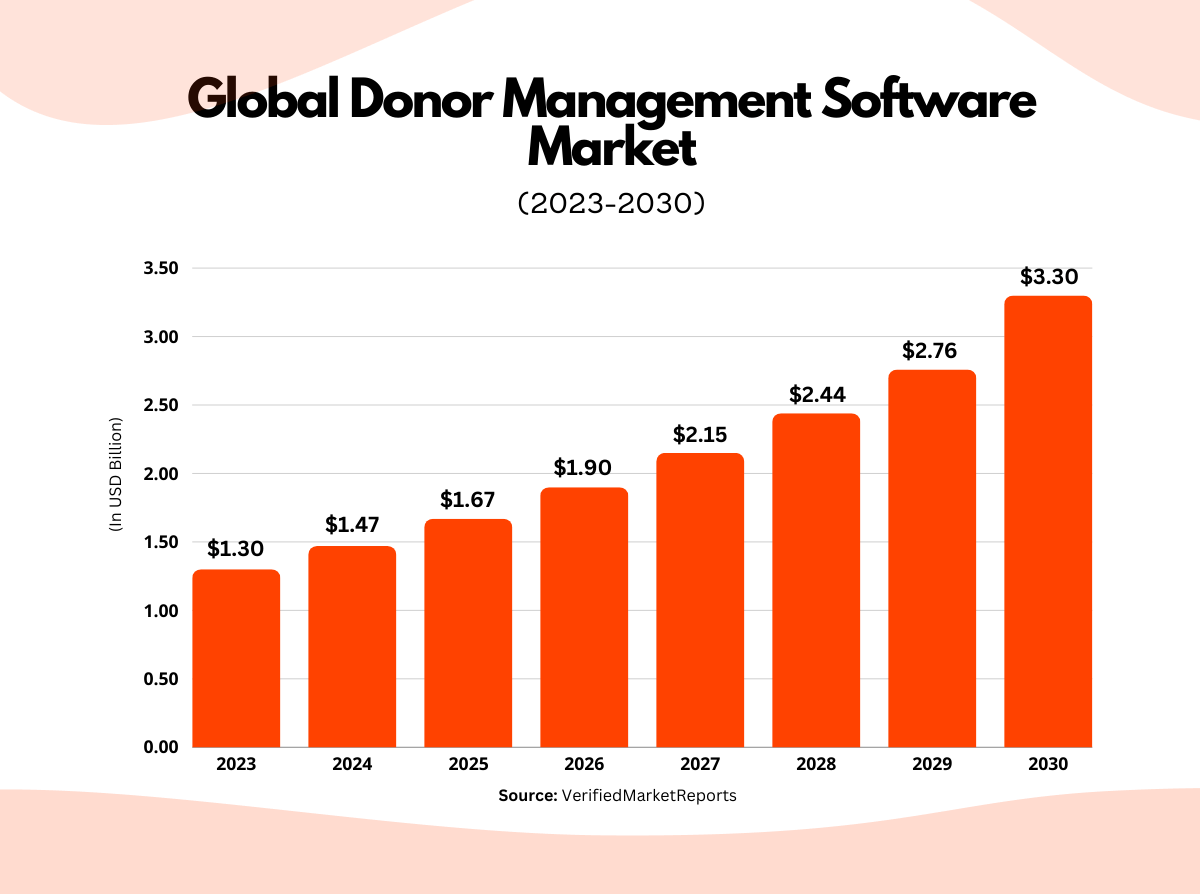
What is Donation Management Software?
A Donor Management System (DMS) is a specialized software solution designed to help non-profit organizations build and manage relationships with donors, leading to increased donations and a more substantial donor base.
These DMS solutions help nonprofits efficiently manage various aspects of donor engagement, including personalized communication, targeted fundraising campaigns, and meticulous donation tracking. This comprehensive approach enables organizations to build deeper connections with their supporters, enhancing donor loyalty and retention.
Moreover, a DMS provides valuable insights through advanced reporting and data analysis capabilities, empowering nonprofits to make informed decisions and refine their fundraising strategies. By automating routine tasks and streamlining processes, organizations can allocate resources to high-impact activities, ultimately driving a more significant social impact.
Benefits of Donor Management Software for Non-Profit Organizations
Donor management software is a game-changer for nonprofits, providing a comprehensive solution to efficiently manage and engage with supporters. By streamlining donation tracking, consolidating donor information, and simplifying communication, this solution helps organizations to focus on what matters most – building meaningful relationships with their donors.
Key Advantages of Donor Management Software –
#1. Boost Operational Efficiency
The DMS automates routine tasks such as acknowledgment emails, tax receipts, gift processing, and data entry to free up valuable time and resources. This lets your team focus on high-impact activities like donor engagement and strategic planning.
At the same time, seamless integration of DMS with other tools and platforms reduces costs, minimizes errors, and centralizes information, making it easily accessible for informed decision-making.
#2. Identify High-Potential Donors
These software solutions leverage data analytics to uncover patterns and signals that indicate a donor’s likelihood to give more. The software analyzes historical giving data, links donor interests to specific campaigns, analyzes their preference, and scores donors based on engagement.
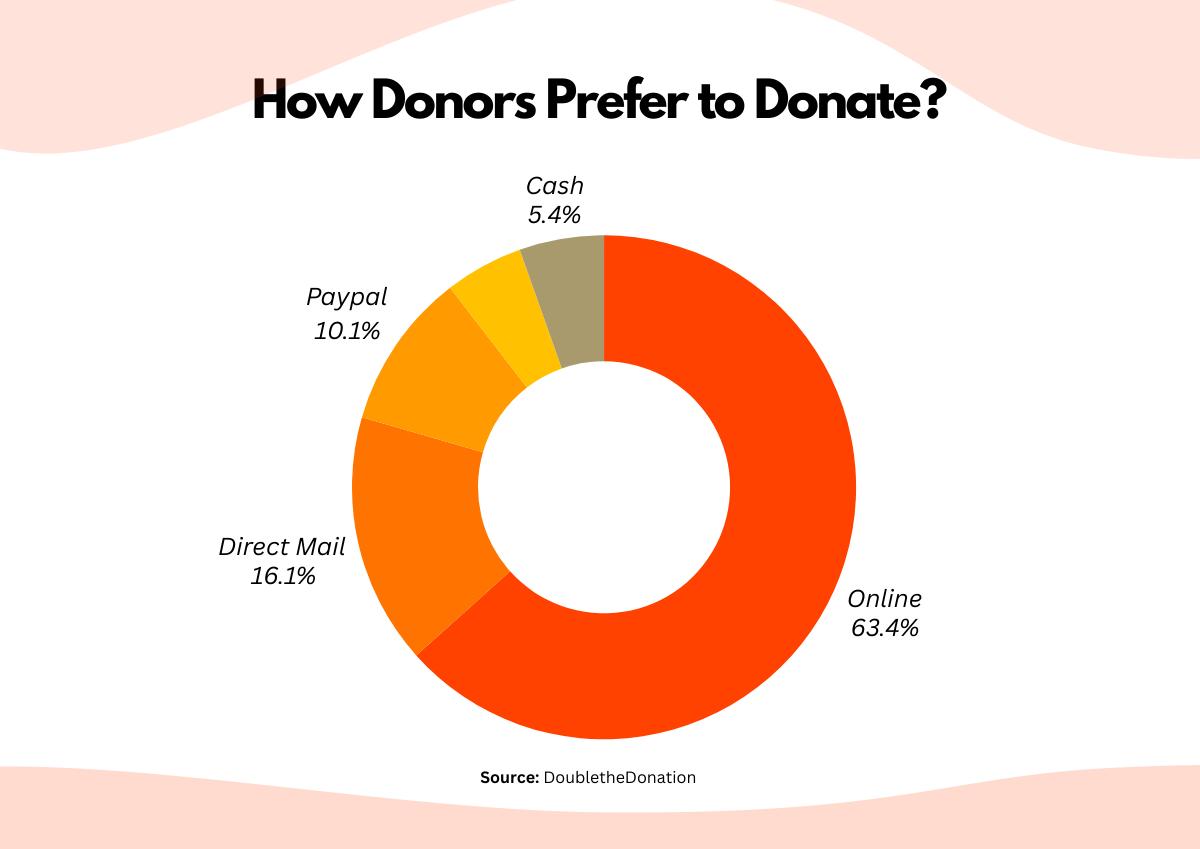
This data-driven approach enables you to prioritize outreach to high-potential donors, creating a more strategic fundraising plan and maximizing your efforts. By harnessing the capabilities of donor management software, nonprofits can optimize their operations, build stronger relationships, and drive greater impact.
#3. Customizing Your Donor Outreach
The software’s ability to track key engagement metrics, such as email engagement, event participation, and social media interactions, helps non-profit organizations refine their outreach strategies. This data-driven approach enables you to move beyond generic messaging, instead creating targeted touchpoints that speak directly to your audience.
When donors feel seen, heard, and valued, they are more likely to maintain their commitment to your cause and become lifelong ambassadors.
#4. Segmentation Donor Outreach
Donor management software also provides powerful segmentation tools, allowing you to categorize your donor base based on their giving history, interests, and behavior. This enables you to create targeted communications that resonate with each group, increasing the effectiveness of your outreach efforts.
By connecting with donors personally, you can inspire them to take action, whether through increased donations, social media advocacy, or volunteerism. Adopting a personalized approach can strengthen your relationships, drive engagement, and ultimately advance your mission.
#5. Strengthening Donor Relationships, Boosting Retention
The nonprofit sector faces a significant challenge: retaining donors. On average, only 40-45% of donors return to support an organization the following year.
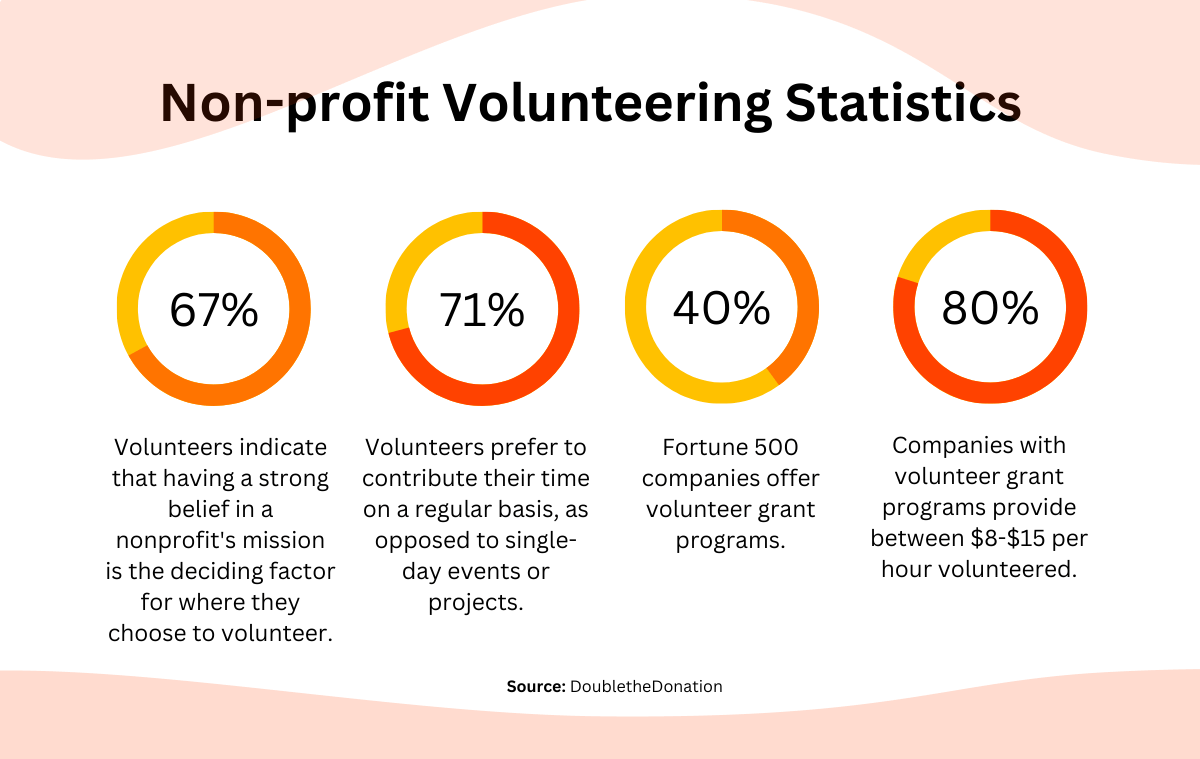
Donor management software offers a solution to this issue by providing tools that encourage ongoing support, such as convenient monthly giving programs. By regularly engaging donors with personalized updates and recognition, nonprofits can foster a sense of connection, increasing loyalty and retention.
#6. Data-Driven Decision Making
Donor management software helps nonprofits to make informed decisions by providing comprehensive reports on fundraising performance. These reports offer a detailed analysis of campaign success, donor segmentation, and fund allocation, giving a clear picture of fundraising efforts.
Visual tools like charts and graphs make complex data easy to understand, enabling data-driven decision-making. Customizable reporting features allow nonprofits to track specific metrics relevant to their goals, while automated report generation and delivery ensure that stakeholders are always informed.
This feature is particularly useful for board meetings and stakeholder updates, making it easy to share progress and insights. By leveraging these reporting capabilities, nonprofits can refine their fundraising strategies, optimize resources, and drive greater impact.
Core Features & Functionalities for a Donor Management Software
When it comes to developing custom donor management software, there isn’t a universal solution. The best features for your organization depend on your specific needs.
Here are some key features to consider:
#1. Fundraising Tools
- Scheduled Giving: Enables donors to set up automatic donations.
- Donation Pages/Forms: A dedicated page for online donations.
- Donation Buttons: Buttons on your website that lead to your donation page.
- Team Fundraising: Allows supporters to form teams and raise funds for you.
- Supporter-Led Fundraising: Enables supporters to start their own fundraising campaigns.
- Event Registration: Accept online registrations and distribute tickets for events.
- Donor Potential Estimation: Uses public data to estimate a donor’s giving capacity.
- Matching Gift Search: Identifies matching gift opportunities from employers.
- Text Donations: Collect donations via text messages.
- Payment Processing: Accepts credit card donations.
#2. Donor Communications
- Email Receipts: Automatically generates email receipts for donations.
- Tax Summary Generator: Creates tax summaries for each donor and allows bulk sending of year-end tax summaries.
- Mass Email Platform: Sends bulk emails to your contacts.
- Interaction History: Records all interactions with your contacts, including visits, calls, emails, and mailings.
- Contact Segmentation: Filters contacts based on certain criteria, enabling targeted and personalized communication.
#3. Donor Management and Pledge Tracking
- Pledge Tracking: Monitor and collect donation pledges from your donors
- Contact Profiles: Create detailed contact profiles, including giving history, communication records, and more
- Donor Accounts: Provide donors with secure access to their giving history, recurring donations, and tax receipts
- Group Segmentation: Segment your contacts into targeted groups based on specific criteria
- Tasks and Reminders: Set automated tasks and reminders to maintain strong donor relationships
- Household Tracking: Track relationships between donors and streamline communication
- Donation Tracking: Record every transaction, regardless of payment method, be it through credit card, NEFT, cash, or cheque.
- Self-import Tool: Import data from offline sources with DMS’ self-import tool
- Custom Fields: Create custom fields for donation pages and registration forms
- Contact Duplicate Finder: Identify and merge duplicate contact data from multiple data sources.

#4. Tracking and Reporting
- Donor Analytics: Analyze high-level donor data using tools like donor analytics and donor pyramids
- Custom Reports: Generate custom reports based on specific criteria
- Scheduled Reports: Schedule recurring reports, such as lapsed donors, to be sent to you or your team
- Donor and Contact Records: Access detailed records of all interactions with each contact
- Donor Dashboard: Visualize your organization’s performance on a single, easy-to-use dashboard
#5. Apps and Integrations
- Email marketing integrations with Mailchimp, Constant Contact, and more
- Accounting integrations with QuickBooks and other software
- Fundraising tool integrations with GoFundMe Charity, Qgiv, iDonate, and more
- Event registration and auction integrations with Eventbrite, TicketSpice, Handbid, and more
- Payment processing integrations with Square, PayPal, Stripe, and other processors
Custom DMS Software vs. Off-the-Shelf Solutions: Which One Should You Choose?
When it comes to donor management, nonprofits face a crucial decision: should they invest in custom-built software or opt for a ready-made solution? Each approach has its advantages and disadvantages.
Custom-Built Donor Management Software
A custom-built solution offers the ultimate flexibility, allowing nonprofits to design a system that perfectly mirrors their unique workflows, data needs, and reporting requirements. This tailored approach can lead to increased efficiency and more insightful analytics.
However, this level of customization comes at a cost. Nonprofits must invest significant time, resources, and budget into the design, development, and testing phases. Additionally, they must factor in the ongoing expenses of maintaining and upgrading the system as technology evolves.
Ready-Made Donor Management Tools
In contrast, off-the-shelf donor management platforms provide a cost-effective and rapid solution. These software-as-a-service (SaaS) offerings cater to the common needs of nonprofits, featuring donor tracking, online donation processing, and reporting dashboards.
The subscription-based pricing model allows organizations to scale their usage as needed without requiring significant upfront investments. However, ready-made platforms may not offer the same level of customization as a custom solution.
Nonprofits must adapt their processes to fit the software’s predetermined functionality, which may lead to compromises or workarounds. Furthermore, a SaaS platform’s long-term costs may exceed a custom system’s upfront investment, depending on an organization’s specific requirements and growth trajectory.
Ultimately, the choice between custom-built and ready-made donor management solutions depends on an organization’s unique needs, budget, and priorities.
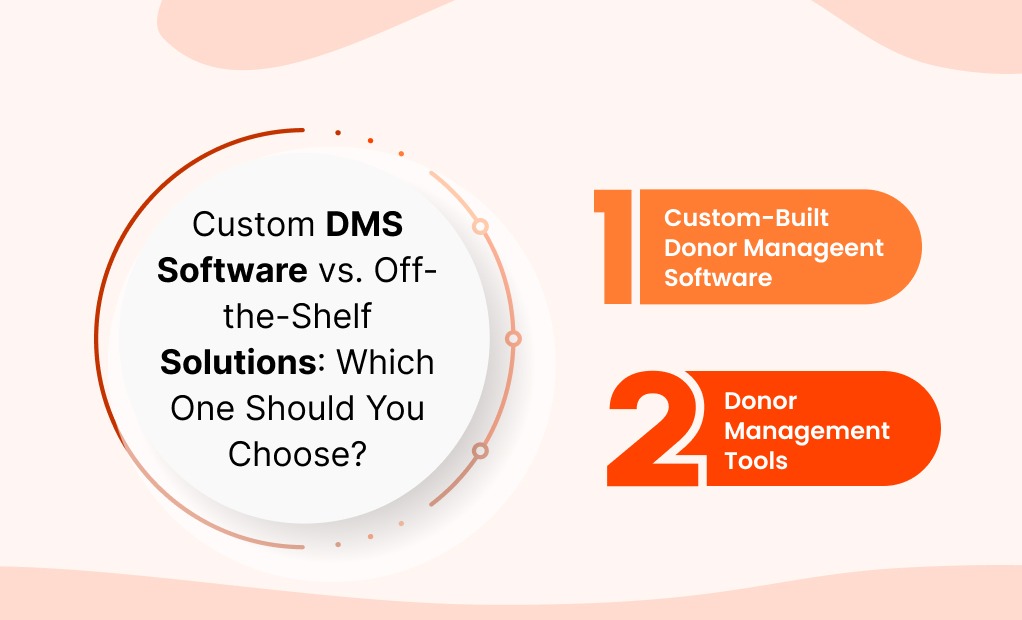
How to Develop a Custom Donor Management Software?
To create an effective Donor Management System (DMS), it is essential to follow a structured approach that aligns with your organization’s unique needs and objectives. This section outlines the critical stages of building a DMS, ensuring your software meets your specific requirements.
Step 1: Define Your Objectives
Identify the key outcomes you want to achieve through your fundraising and donor management efforts. Are you looking to expand your donor base, enhance engagement, increase donation amounts, or streamline operations?
As each nonprofit has a distinct mission and operational framework, your goals should reflect your organization’s vision and desired outcomes. It’s crucial to set SMART (Specific, Measurable, Achievable, Relevant, and Time-bound) objectives, as these will directly impact the features and functionality of your DMS, ensuring it provides the necessary support to meet your targets.
Step 2: Ensure Compliance with Regulatory Requirements
When handling sensitive donor information, compliance with regulatory requirements is paramount. Nonprofits must adhere to various legal standards, such as the General Data Protection Regulation (GDPR) in Europe, the Health Insurance Portability and Accountability Act (HIPAA) in the US health sector, and local data protection laws.
It’s essential to consider these regulations when designing your DMS to ensure legal compliance. This includes incorporating robust data security features, protecting donor privacy, and implementing opt-in and opt-out mechanisms in your communication strategies. By ensuring compliance, you can safeguard donor data and foster trust among your supporters.
Step 3: Partner with a Reputable Development Team
With your requirements clearly defined, the next crucial step in developing your donor management software is to hire a skilled software development company. A dedicated team of experts is essential to transform your ideas into a functional reality.
By collaborating with a reputable firm, you will gain access to a comprehensive range of services, including expert consultation, user-centered UI/UX design, secure development, and more. With a top-notch development company, you will have a single point of contact for all your development needs and flexible pricing options to suit your budget.
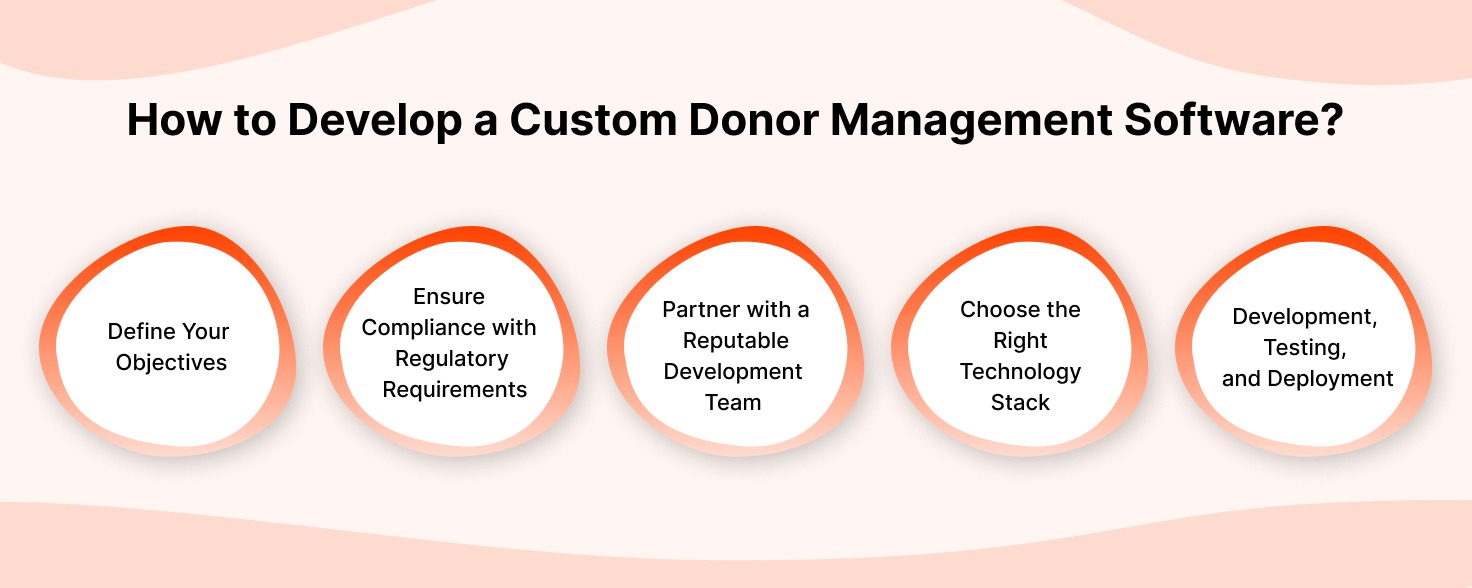
Step 4: Choose the Right Technology Stack
A professional software development company leverages its technical expertise to enhance your donor management software development process. Selecting the right technology stack is critical to building software that meets its intended purpose. Here, we will provide an overview of the typical technology stack used to develop a robust donor management system:
Front-end
- HTML/CSS
- React, Angular, or Vue.js
- JavaScript
UI Frameworks
- Bootstrap
- Semantic-UI
- Material-UI
Server-Side Language
- Node.js
- Ruby
- Python
Web Framework
- Express.js (for Node.js)
- Ruby on Rails (for Ruby)
- Django (for Python)
Database Management System (DBMS)
- MongoDB
- MySQL or PostgreSQL
Other Technologies
- Authentication and Authorization: JWT (JSON Web Tokens), OAuth, or Firebase Authentication.
- WebSocket: ActionCable (Ruby on Rails) or Socket.io (Node.js).
- Cloud Hosting: Google Cloud Platform (GCP), Amazon Web Services (AWS), or Microsoft Azure.
- Monitoring and Logging: New Relic, ELK Stack, or Datadog
- Payment Gateway Integration: PayPal, Stripe, or Square.
- Containerization and Orchestration: Kubernetes or Docker.
- Version Control: Git
- Continuous Integration/Continuous Deployment (CI/CD): Travis Cl, Jenkins, or CircleCI
- Testing and QA Tools: Chai, Mocha, PyTest, or RSpec
Step 5: Development, Testing, and Deployment
With a clear understanding of your project’s requirements, competitor analysis, and the latest trends, it’s time to initiate the development process. However, selecting the right development methodology is crucial to achieving optimal results.
Adopting an Agile approach, such as Scrum or Kanban, can facilitate iterative development and efficient project management. This methodology breaks down the project into manageable sprints, sets clear objectives, and prioritizes tasks for each sprint. Regular meetings and sprint reviews enable tracking progress, addressing challenges, and adjusting project scope as needed.
Thorough testing is a critical step in ensuring the success of your software. Partnering with a software development company that offers a range of testing techniques guarantees your software’s seamless functionality. At Mtoag Technologies, we provide both manual and automated software testing to ensure your custom-built software meets its intended purpose.
Once testing is complete, it’s time to deploy your software on the cloud or a local server, depending on your specific requirements. This marks the final stage of Donor management software, and with the right development methodology and testing approach, you can be confident in its success.
How Much Does Donor Management Software Development Cost?
The cost of developing custom donor management software varies depending on several factors, including the region, technology stack, and features. While they are slightly more expensive than off-the-shelf solutions, they are worthwhile investments when it comes to scalability, efficiency and customization.

Donor management software development cost based on location
- In the United States, the hourly rate for software development ranges from $100 to $250.
- In Europe, the hourly rate ranges from €75 to €200 per hour.
- In Asia, the hourly rate ranges from $25 to $100 per hour.
Donor management software development cost is based on complexity
- Basic donor management software with minimal features: 500-1,000 hours, costing $50,000 to $250,000.
- Mid-level software with standard features: 1,500-3,000 hours, costing $150,000 to $750,000.
- Advanced software with custom features: 3,000-6,000 hours, costing $300,000 to $1,500,000.
Crucial Factors Affecting the Cost of Donor Management Software
- Technology stack (e.g., cloud-based, mobile app, or web application)
- Number of users and scalability requirements
- Integration with existing systems (e.g., CRM, payment gateways)
- Customization and complexity of features
- Development team’s experience and location
It’s essential to consult with a software development company to get an accurate estimate for your specific donor management software needs.
Conclusion
As you explore this guide to donor management software development, it’s essential to focus on the key aspects that will drive success. A well-designed and feature-rich software solution can transform your operations, enhance the donor experience, and inform data-driven decision-making.
To achieve this, you need a reliable partner like Mtoag Technologies to guide you through the development process. We are a leading software development company dedicated to revolutionizing project development. Our team of experts, equipped with the latest tools and technologies, will deliver a high-quality software solution that meets current market standards.
We prioritize robust security regulations to ensure the safety of your data. With Mtoag, you can rest assured that your project will be completed on time and within budget. If you have questions about the development cycle, cost or need consulting services to refine your ideas, our experts are here to help. Contact us anytime and book your free consultation today.
FAQs
What is a CRM for Donors?
A CRM (Customer Relationship Management) for donors, or Donor management software (DMS), is a specialized software that helps non-profit organizations manage and analyze interactions with donors, volunteers, and other stakeholders. It enables tracking of donations, communication, and engagement, facilitating personalized relationships and targeted fundraising efforts.
How Long Does it Take to Develop Donor Management Software?
The development time for donor management software varies depending on the complexity, features, and technology stack. On average, a comprehensive, customized solution can take 3-6 months for a basic system, 6-12 months for a mid-level system, and 1-2 years or more.
What is a CRM System in Fundraising?
A CRM system in fundraising is a technology platform that streamlines donor data management, communication, and engagement. It helps non-profits build strong relationships, identify opportunities, and optimize fundraising strategies. A CRM system can integrate with other tools, such as email marketing and event management software, to enhance overall fundraising performance.
What Donation Management Software is Recommended?
We recommend custom-built donation management software tailored to an organization’s specific needs. This approach ensures seamless integration with existing systems, flexibility, and scalability. A custom solution can also provide a competitive edge regarding features, user experience, and data analysis capabilities.
What is a Donor Platform?
A donor platform is a comprehensive software solution that enables non-profit organizations to manage donor relationships, track donations, and analyze engagement. It provides a centralized hub for donor data, communication, and fundraising efforts, helping organizations build strong, lasting relationships and drive successful fundraising campaigns.

